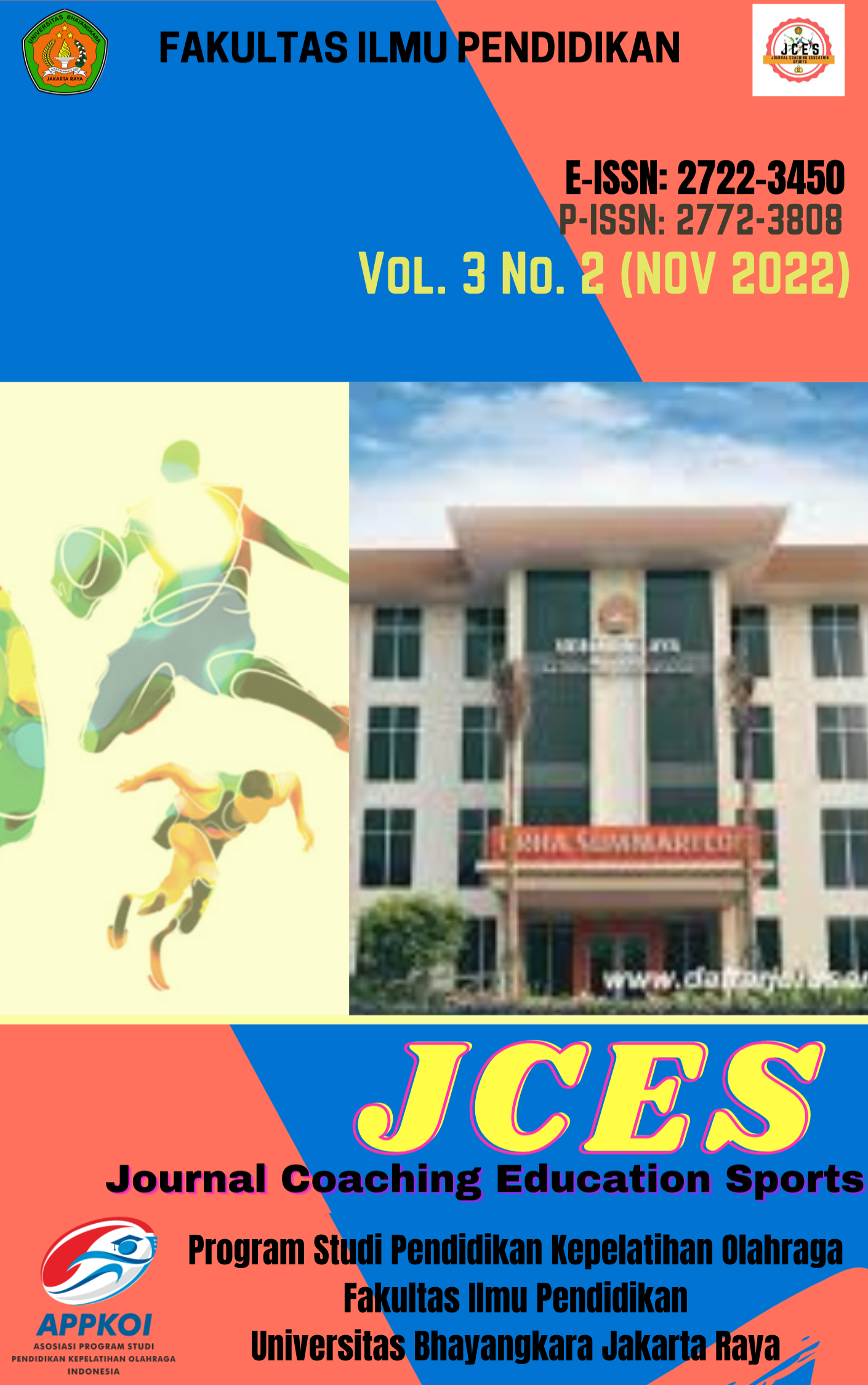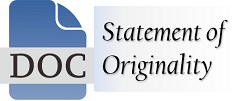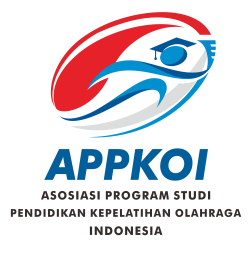The Effectiveness of Corner Online Learning During a Pandemic
DOI:
https://doi.org/10.31599/29vb6t37Keywords:
Effectiveness, Learning Online, PJOKAbstract
This study aims to describe the effectiveness of online learning during the COVID-19 pandemic in PJOK subjects. This study uses a quantitative descriptive research design with a one-shot case study approach using survey methods. Data analysis techniques using quantitative descriptive analysis with percentage data. The results showed that during the COVID-19 pandemic 100% of teachers continued to provide PJOK learning, 66.7% of teachers used online learning methods 22.2% of PJOK learning was by the lesson plan, and 66.7% according to the lesson plans but not coherently 66.7% used WhatsApp group learning media, 66.7 % of students enthusiastic and participating well in learning 77.8% of teachers working with parents of students so that the PJOK learning process continues 44.4% of teachers say learning is by lesson plans 77.8% assessment based on a collection of assignments and exams 88.9% of teachers say assessment on online learning is not effective and 88.9% of obstacles in PJOK learning are difficulty accessing the internet.
Downloads
References
Arikunto, S. (2017). Pengembangan Instrumen Penelitian dan Penilaian Program. Yogyakarta: Pustaka Pelajar
Bergeron, M. F., Mountjoy, M., Armstrong, N., Chia, M., Côté, J., Emery, C. A.,Faigenbaum, A., Jr, G. H., Kriemler, S., Léglise, M., Malina, R. M., Pensgaard, A. M., & Sanchez, A. (2015). International Olympic Committee consensus statement on youth athletic development. 843–851. https://doi.org/10.1136/bjsports-2015-094962
Bijen, F., & Ferman, K. (2020). Teaching Strategies for Physical Education during the COVID-19 Pandemic. Journal of Physical Education, Recreation & Dance, 91(9), 48–50. https://doi.org/10.1080/07303084.2020.1816099
Cearense, T. (2020). Pandemia do Coronavírus no Brasil : Impactos no Pandemia do Coronavírus no Brasil: Impactos no Território Cearense. https://doi.org/10.4000/espacoeconomia.10501
Deng, C. H., Wang, J. Q., Zhu, L. M., Liu, H. W., Guo, Y., Peng, X. H., Shao, J. B., & Xia, W. (2020). Association of web-based physical education with mental health of college students in wuhan during the COVID-19 outbreak: Cross-sectional survey study. Journal of Medical Internet Research, 22(10). https://doi.org/10.2196/21301
Granero-gallegos, A., & Baena-extremera, A. (2019). Interaction E ff ects of Disruptive Behaviour and Motivation Profiles with Teacher Competence and School Satisfaction in Secondary School Physical Education. International Journal of Environmental Research and Public Health, 1–14. https://doi.org/https://doi.org/10.3390/ijerph17010114
Hortigüela-Alcalá, D., Hernando-Garijo, A., & Ángel Pérez-Pueyo. (2021). La Educación Física en el contexto COVID-19. Un relato de profesores de
diferentes etapas educativas. Retos, 41, 764–774. https://doi.org/https://recyt.fecyt.es/index.php/retos/index
Kemendikbud Nomor 4 Tahun. (2020). Tentang Pelaksanaan Pendidikan Dalam Masa Darurat Coronavirus Disease (Covid-19). Jakarta
Majumder, M. S., & Kenneth D. Mandl. (2020). Early transmissibility assessment of a novel coronavirus in Wuhan, China. 713.
Medeiros, A. D. A., Batiston, A. P., de Souza, L. A., Ferrari, F. P., & Barbosa, I. R. (2021). Analysis of physical therapy education in Brazil during the COVID-19 pandemic. Fisioterapia Em Movimento, 34, 1–9. https://doi.org/10.1590/fm.2021.34103
Muhamamad, S. (2018). Pelaksanaan Proses Belajar Mengajar Pendidikan Jasmani Olahraga dan Kesehatan Pada Sekolah Dasar. Jurnal Pendidikan Jasmani Dan Olahraga, 1(2), 64–73. https://doi.org/https://doi.org/10.31539/jpjo.v1i2.136
Pérez-Campos Mayoral, L., HernándezHuerta, M. T., Mayoral-Andrade, G., Pérez-Campos Mayoral, E., & PérezCampos, E. (2020). A letter to the editor on “World Health Organization declares global emergency: A review of the 2019 novel Coronavirus (COVID-19).” International Journal of Surgery, 79(January), 163–164. https://doi.org/10.1016/j.ijsu.2020.05.066
Picot, S., Marty, A., Bienvenu, A. L., Blumberg, L. H., Dupouy-Camet, J., Carnevale, P., Kano, S., Jones, M. K., Daniel-Ribeiro, C. T., & Mas-Coma, S. (2020). Coalition: Advocacy for prospective clinical trials to test the post-exposure potential of hydroxychloroquine against COVID19. One Health, 9(January). https://doi.org/10.1016/j.onehlt.2020.100131
Qomarrullah, R. (2015). Model Aktivitas Belajar Gerak berbasis Permainan Sebagai Materi Ajar Pendidikan Jasmani. Journal of Physical Education, Health and Sport, 2(2), 76–88.
Sollerhed, A., Horn, A., Culpan, I., & Lynch, J. (2020). Adolescent physical activity-related injuries in school physical education and leisure-time sports. https://doi.org/10.1177/0300060520954716
Sugiyono. (2017). Metode Penelitian Kuantitatif Kualitatif dan R&D. Bandung: PT Alfabeta.
UU No. 20. (2003). Undang-Undang Republik Indonesia No. 20 Tentang Sistem Pendidikan Nasional (Issue 1).
Zu, Z. Y., Jiang, M. D., Xu, P. P., Chen, W., Ni, Q. Q., Lu, G. M., & Zhang, L. J. (2020). Coronavirus Disease 2019 (COVID-19): A Perspective from China. Radiology, 2019, 200–209.
Downloads
Published
Issue
Section
License
Copyright (c) 2022 Sardiman, Didik Purwanto

This work is licensed under a Creative Commons Attribution 4.0 International License.






.png)







